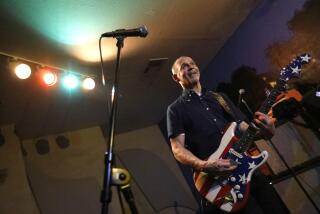Band Pounds Out Tunes on Own Terms
- Share via
The four members of Claw Hammer freely admit they lack many of the accouterments that an aspiring, success-oriented alternative-rock band ought to have. They don’t seem very concerned about it.
“We’ve never had a manager, never had a lawyer. We haven’t toured enough. There’s a lot of things we should have done that we didn’t do,” says co-founder Christopher Bagarozzi, breezily running down the checklist of rock-biz dos and don’ts Claw Hammer has managed to ignore.
“I’d love to make tons of money,” the burly guitarist said, “but for me the goal was to be in a band that I liked, and I didn’t care if anybody else did. I wanted to please myself.”
In its seven-year existence, even without the assistance of managers or lawyers, the Long Beach/Los Angeles band has managed to make a good deal of thoroughly wired, hard-edged music that weds a bluesy feel with a punk rock sense of abandon.
*
The key feature of Claw Hammer’s sound is the raucous yet honed guitar interplay between Bagarozzi and the band’s other founder, Jon Wahl. Largely dispensing with the distortion and simple-mindedness of grunge-style guitar, Claw Hammer’s albums feature two equal players riffing and soloing freely and simultaneously in a way that implies chaos yet adheres to well-conceived structures.
The Claw Hammer guitarists are steeped in the underground rock tradition, citing as models such twin-guitar precursors as the MC5 and Television. At their sizzling best, abetted by the flexible bass-and-drums team of Rob Walther and Bob Lee, they can call to mind the thrust and probing spaciousness achieved by the Meat Puppets, whose Curt Kirkwood is one of the best guitarists to have come out of the indie-rock boom of the 1980s.
Wahl, who sings and writes the lyrics, tries to make up in maniacal impact what he lacks in melodiousness. His drawling and yelping echo and amplify the nasal style of Television alumni Tom Verlaine and Richard Hell, with some of the twisted blues phrasing of avant-rock hero Captain Beefheart thrown in.
Beefheart’s “Trout Mask Replica” album held a place of honor on the top of a stack of LPs in Wahl’s Long Beach living room, where the members of Claw Hammer gathered for an interview. That’s not surprising for a band that named itself after one of the album’s tracks, “Orange Claw Hammer.”
Claw Hammer started pounding late in 1986 after Bagarozzi answered a musician-wanted ad placed by Wahl.
A product of the fertile Fullerton-area punk rock scene, Wahl had attended Placentia High School, where classmate Mike Palm, leader of Agent Orange, sold him his first guitar and taught him how to play it. Wahl got some national exposure in 1985 when he joined the Pontiac Brothers and played on their acclaimed U.S. debut, “Doll Hut.” But he quit the Pontiacs after nine months, despite their then-bright prospects.
“I wanted to do something weirder, something more like Claw Hammer is doing,” he said.
Bagarozzi was living in El Toro at the time, taking film classes at Cal State Long Beach and getting frustrated over his inability to find a band he liked playing in. When he saw the influences listed in Wahl’s ad--the MC5, Mott the Hoople, the Stooges and the Replacements--he answered it and got the job, even though the ad sought a piano player, not a guitarist.
Walther joined the band on bass in 1987, after Claw Hammer had debuted with singles for Trigon Records, a label owned by Wahl’s brother. Lee signed on in 1990 after the band had recorded its first album.
“We were never serious at first,” Bagarozzi recalled. “I never thought we’d put a record out. I thought we’d just play.”
*
But Claw Hammer began to gain fans. One was Long Gone John, owner of the Long Beach-based independent label Sympathy for the Record Industry, who underwrote the band’s first three albums. Another was Brett Gurewitz, guitarist with the successful punk band Bad Religion.
“They are my favorite band,” Gurewitz said in a separate interview. “Their improvisational bits are absolutely genius, and they do it within the context of pop songwriting. I think that makes them a lot different and a lot greater than pretty much anything I’ve heard recently.”
More to Read
The biggest entertainment stories
Get our big stories about Hollywood, film, television, music, arts, culture and more right in your inbox as soon as they publish.
You may occasionally receive promotional content from the Los Angeles Times.











